Consuming two liters of diet soda or other artificially sweetened drinks a day can increase the risk of a dangerous irregular heartbeat by 20 percent compared with people who drink none, according to a new study by researchers in China.
The study, from Shanghai, found that people who drink such beverages are more susceptible to a condition known as atrial fibrillation.
Theodore Maglione, an assistant professor of medicine and a cardiologist specializing in cardiovascular disease and cardiac arrhythmias at Robert Wood Johnson University hospital in New Jersey, said: “Atrial fibrillation is a chaotic quivering of the top chambers of the heart. Normally, they beat in an organized fashion.”

Photo: AFP
Symptoms of atrial fibrillation, or “A-fib,” include “fatigue, shortness of breath, [and] palpitations,” Maglione said.
A-fib can often be genetic, Maglione said, but there are also some modifiable risk factors.
“Some things you cannot control are your genetics and age — which is a big risk factor as well. Some of the things you can control would include smoking, hypertension, uncontrolled sleep apnea, obesity and nutrition,” he said.

Photo: AP
Making sure blood pressure is optimized is important when it comes to A-fib, as well as a “heart-healthy lifestyle,” Maglione said.
“Diet and exercise has been shown to decrease recurrence rates of atrial fibrillation after we treat them with certain procedures,” he said.
“The jury’s not out on whether the low-calorie or zero-calorie sodas with artificial sweeteners are any healthier than the conventional for-calorie sodas.”
Maglione said that when it comes to A-fib and nutrition, avoiding foods that are high in cholesterol and fat, and doing regular exercise, are key.
“Even modest weight loss has been associated with much lower recurrence rates of atrial fibrillation after treatment,” he said.
A-fib can also lead to blood clots, strokes and other heart-related complications.
The US’s Centers for Disease Control and Prevention says stroke is “a leading cause of serious long-term disability.” And atrial fibrillation is the leading cause of stroke in the US.
Those above 65 are at greater risk for heart conditions such as A-fib and stroke, making it more important for this group to follow a healthy lifestyle and to avoid artificially sweetened drinks.
Maglione said there was also some evidence linking atrial fibrillation to early dementia later in life.
The study also looked at added-sugar beverages and pure unsweetened juices, such as orange juice. It was found that added-sugar beverages raised the risk of A-fib by 10 percent, while drinking roughly four ounces of pure unsweetened juices lowered the risk of the condition by 8 percent.
Penny Kris-Etherton, a nutritional sciences professor at Penn State University, told CNN: “This is the first study to report an association between no and low-calorie sweeteners and also sugar-sweetened beverages and increased risk of atrial fibrillation.”
Soda fiend or not, Maglione said it was important to be aware when it comes to medical matters of the heart.
“If you feel any symptoms of irregular heartbeat or palpitations, seek out medical care,” he said. “Because usually with earlier intervention, we can be more successful in treatment and preventing any of the things like stroke from occurring.

Jacques Poissant’s suffering stopped the day he asked his daughter if it would be “cowardly to ask to be helped to die.” The retired Canadian insurance adviser was 93, and “was wasting away” after a long battle with prostate cancer. “He no longer had any zest for life,” Josee Poissant said. Last year her mother made the same choice at 96 when she realized she would not be getting out of hospital. She died surrounded by her children and their partners listening to the music she loved. “She was at peace. She sang until she went to sleep.” Josee Poissant remembers it as a beautiful

March 2 to March 8 Gunfire rang out along the shore of the frontline island of Lieyu (烈嶼) on a foggy afternoon on March 7, 1987. By the time it was over, about 20 unarmed Vietnamese refugees — men, women, elderly and children — were dead. They were hastily buried, followed by decades of silence. Months later, opposition politicians and journalists tried to uncover what had happened, but conflicting accounts only deepened the confusion. One version suggested that government troops had mistakenly killed their own operatives attempting to return home from Vietnam. The military maintained that the

Before the last section of the round-the-island railway was electrified, one old blue train still chugged back and forth between Pingtung County’s Fangliao (枋寮) and Taitung (台東) stations once a day. It was so slow, was so hot (it had no air conditioning) and covered such a short distance, that the low fare still failed to attract many riders. This relic of the past was finally retired when the South Link Line was fully electrified on Dec. 23, 2020. A wave of nostalgia surrounded the termination of the Ordinary Train service, as these train carriages had been in use for decades

Lori Sepich smoked for years and sometimes skipped taking her blood pressure medicine. But she never thought she’d have a heart attack. The possibility “just wasn’t registering with me,” said the 64-year-old from Memphis, Tennessee, who suffered two of them 13 years apart. She’s far from alone. More than 60 million women in the US live with cardiovascular disease, which includes heart disease as well as stroke, heart failure and atrial fibrillation. And despite the myth that heart attacks mostly strike men, women are vulnerable too. Overall in the US, 1 in 5 women dies of cardiovascular disease each year, 37,000 of them